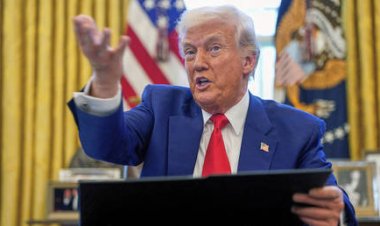Joe Biden Faces His Most Challenging and Personal Decision Yet
Article Description: This piece explores the controversial question of whether the president should grant a pardon to his son. It delves into the legal, ethical, and political implications surrounding this decision, offering a range of perspectives and expert opinions on the matter. The article examines public sentiment, potential consequences, and the broader context of presidential pardons.

In just a few weeks, Hunter Biden is scheduled for sentencing in two separate criminal cases. On December 12, he will be in federal court in Delaware, following his conviction for purchasing a gun in 2018 while struggling with addiction. Shortly after, he will appear before a federal judge in Los Angeles for sentencing related to tax fraud charges, to which he pleaded guilty in September as a trial was on the verge of starting.
There has been ongoing speculation in Washington about whether President Biden will choose to pardon his son. This question encompasses a tangled web of legal, political, practical, and historical implications. Ultimately, should he consider it?
In light of Trump’s recent victory, Biden has strong grounds to commute Hunter's potential prison sentence before leaving office. This wouldn’t be a full pardon but would indicate a significant act of mercy.
A commutation wouldn’t absolve Hunter Biden of his actions or imply innocence; however, it could prevent years of imprisonment and additional strain for the Biden family.
It’s important to note that this move would mark a shift for the president. Throughout his reelection campaign, Biden consistently stated he would not provide a pardon or commute any sentence for his son, a position reiterated by the White House shortly after Trump’s election.
Nevertheless, Biden might have compelling reasons to reconsider his stance. He has effectively lost his position as the Democratic Party’s nominee for 2024 and must face a scenario where Trump, who has manipulated the pardon power more than any president in modern history, returns to the White House.
First, one must recognize that the charges against Hunter Biden likely would not have been pursued against anyone else.
This is not to excuse his behavior, but the gun-related charges are unprecedented, and the circumstances surrounding the tax fraud are typically resolved by the Justice Department through repayment and/or fines.
The current situation arises from a campaign led by Trump and his Republican allies that successfully pressured Biden’s Justice Department to take action against his son.
Last summer, a deal had been arranged where Hunter Biden would plead guilty to two misdemeanor tax charges and enter a pretrial diversion program regarding the gun charges. However, Congressional Republicans rejected this arrangement, alleging it was a “sweetheart deal,” leading the presiding judge in Delaware to nullify the agreement.
Delaware U.S. Attorney David Weiss, a registered Republican appointed by Trump, opted for a more expansive set of charges against Biden after the plea deal fell apart. Attorney General Merrick Garland designated Weiss as a special counsel, granting him the authority to pursue further charges, including in Los Angeles.
It remains uncertain whether Weiss will seek imprisonment in either case, and the decisions made by the judges at the upcoming sentencing dates are yet to be seen.
According to relevant sentencing guidelines, Hunter Biden could face a year or more for the gun charges and two to three years for the tax fraud charges.
While these guidelines are not mandatory, every federal sentencing judge must consider them. Recent statistics indicate that approximately 40 percent of federal sentences fall within the guidelines range, but judges have the discretion to weigh various factors to sentence below the recommended range.
It is possible that in Delaware—the venue for the gun charges—the judge could hand down a sentence of probation or a fine, especially given the unusual nature of the charges. If that were the case, the president could refrain from taking action to spare his son from prison time, allowing the conviction to remain.
The situation is considerably more precarious for Hunter in the Los Angeles tax fraud case. The nature of the allegations, the sums of money involved, and the higher guideline range suggest that a term of imprisonment is more probable.
However, should Hunter Biden receive a prison sentence in either case, his father would have every right to commute it.
There would be no real precedent to consider, but there’s also no clear precedent for the entire scenario at hand. The cases against Hunter Trump emerged from a campaign of pressure from Republicans, coupled with Garland’s decision to empower Weiss as a special counsel.
While Trump and his Republican cohorts may object to any intervention by Biden, their complaints lack credibility.
After all, Trump made unprecedented use of the pardon power to shield his political allies, issuing pardons to figures like Paul Manafort, Roger Stone, Steve Bannon, a Republican fundraiser, and even family members.
As Trump exited the presidency, his widespread pardons invited considerable critique—though many Republicans remained silent during that time. It is difficult to see how those who overlooked Trump’s actions could reasonably object to Biden commuting his son’s sentence.
For Biden, he faces at least two significant political and practical considerations.
First is the impact that a commutation would have on his legacy and the Democratic Party’s standing, though Biden may not prioritize these concerns. His political legacy has already been severely damaged with Trump’s rise, and on a personal level, this involves his son.
As for the repercussions for fellow Democrats, Biden likely isn’t inclined to be especially generous these days, given his ousting as the party’s 2024 nominee and the blame for Vice President Kamala Harris' loss.
The second, perhaps more complex, consideration is whether a commutation could prompt the incoming Trump Justice Department to pursue further charges against Hunter Biden.
While it’s unclear what those charges might entail, Republicans have speculated that he could face charges under the Foreign Agents Registration Act due to his overseas political consulting work. Trump has also threatened vengeance against the “entire Biden crime family.” To mitigate that risk, Biden could consider issuing a blanket pardon covering any potential unlawful conduct prior to the date of pardon—but that would be a novel step and could ignite significant political backlash.
Ultimately, this decision for the president is deeply personal. The Biden family has endured struggles with death, divorce, and substance abuse, and a prison sentence for Hunter would only exacerbate their hardships.
In light of all this, it’s understandable if Biden wishes to spend his remaining time in office quietly, alongside his son.
Frederick R Cook for TROIB News
Find more stories on Business, Economy and Finance in TROIB business












